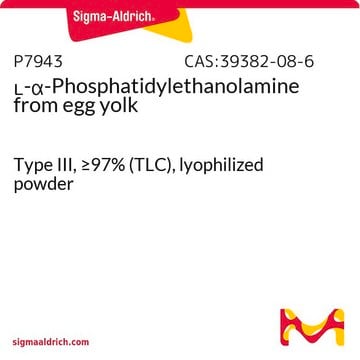L4754
3-sn-Lysophosphatidylethanolamine from egg yolk
Type I, ≥99%
Synonym(s):
1-Acyl-sn-glycero-3-phospho(2-aminoethanol), L-α-Lysocephalin, L-α-Lysophosphatidylethanolamine
Sign Into View Organizational & Contract Pricing
All Photos(2)
About This Item
Recommended Products
biological source
egg yolk
Quality Level
type
Type I
Assay
≥99%
form
powder
lipid type
phosphoglycerides
shipped in
ambient
storage temp.
−20°C
Looking for similar products? Visit Product Comparison Guide
General description
Lysophosphatidylethanolamine (LysoPE), a prominent part of lysophospholipid, is obtained by the partial hydrolysis of phosphatidylethanolamine.
Application
3-sn-Lysophosphatidylethanolamine from egg yolk has been used:
- to prepare liposomes for liposome binding and vesiculation assay
- as a phospholipid standard in high-performance thin layer chromatography (HPTLC) to detect the phospholipid composition of platelet-derived microparticles
- as a phospholipid standard in thin layer chromatography (TLC) to identify phospholipid in parasitophorous vacuoles (PV) containing Leishmania amazonensis
Biochem/physiol Actions
L-α-Lysophosphatidylethanolamines from egg yolk are enriched with stearate and palmitate acylated fatty acids.
Lysophosphatidylethanolamine (LPE) participates in the physiological and pathological processes of the nervous system. It plays a key role in the function of the cell membrane, apoptosis, oxidative stress, and inflammatory responses.
Quality
Contains primarily stearic and palmitic acids.
Storage Class Code
11 - Combustible Solids
WGK
WGK 3
Flash Point(F)
Not applicable
Flash Point(C)
Not applicable
Personal Protective Equipment
dust mask type N95 (US), Eyeshields, Gloves
Certificates of Analysis (COA)
Search for Certificates of Analysis (COA) by entering the products Lot/Batch Number. Lot and Batch Numbers can be found on a product’s label following the words ‘Lot’ or ‘Batch’.
Already Own This Product?
Find documentation for the products that you have recently purchased in the Document Library.
Customers Also Viewed
Yuan-Yuan Zhao et al.
Journal of chromatography. A, 1218(32), 5470-5479 (2011-07-09)
A hydrophilic interaction liquid chromatography-tandem mass spectrometry (HILIC LC-MS/MS) method using multiple scan modes was developed to separate and quantify 11 compounds and lipid classes including acetylcholine (AcCho), betaine (Bet), choline (Cho), glycerophosphocholine (GPC), lysophosphatidylcholine (LPC), lysophosphatidylethanolamine (LPE), phosphatidylcholine (PC)
Jiahong Liu et al.
Frontiers in pharmacology, 12, 735196-735196 (2021-10-05)
Background: Accumulating studies have shown that the pathophysiology of schizophrenia may be associated with aberrant lysophospolipid metabolism in the early stage of brain development. Recent evidence demonstrates that antipsychotic medication can regulate the phospholipase activity. However, it remains unclear whether
E Biró et al.
Journal of thrombosis and haemostasis : JTH, 3(12), 2754-2763 (2005-12-20)
The processes that govern the distribution of molecules between platelets and the microparticles (MP) they release are unknown. Certain proteins are sorted selectively into MP, but lipid sorting has not been studied. To compare the phospholipid composition and cholesterol content
Nguyen Dang Hung et al.
Lipids, 46(10), 893-906 (2011-07-12)
In the present study, the anti-inflammatory action of lysophosphatidylethanolamine (lysoPtdEtn), orally administered, in zymosan A-induced peritonitis was examined. Oral administration of 2-DHA-lysoPtdEtn (ED(50), ~111 μg/kg) or 2-ARA-lysoPtdEtn (ED(50), 221 μg/kg) was found to inhibit the plasma leakage in mice treated with zymosan
C Henriques et al.
Parasitology research, 89(2), 123-133 (2002-12-19)
One fundamental step of Leishmania-macrophage interaction is the phase of parasite internalization through an endocytic process, with the formation of the parasitophorous vacuole (PV). The present study analyzed this process using two approaches. First, to investigate the host cell proteins
Our team of scientists has experience in all areas of research including Life Science, Material Science, Chemical Synthesis, Chromatography, Analytical and many others.
Contact Technical Service












